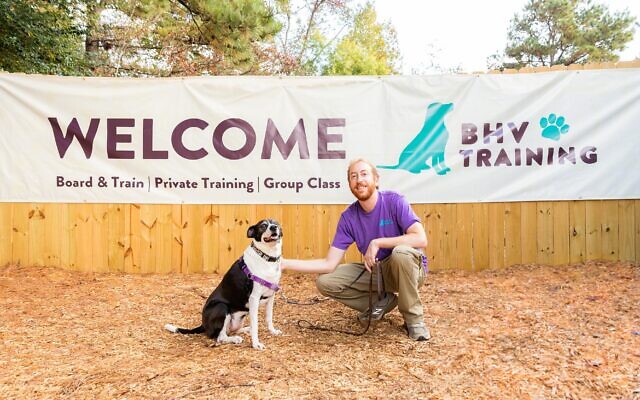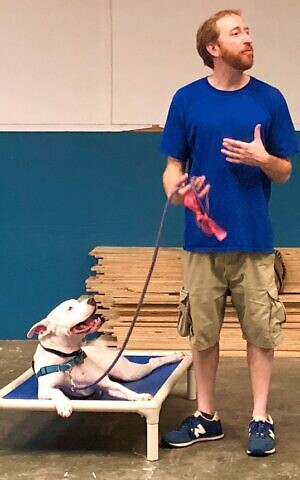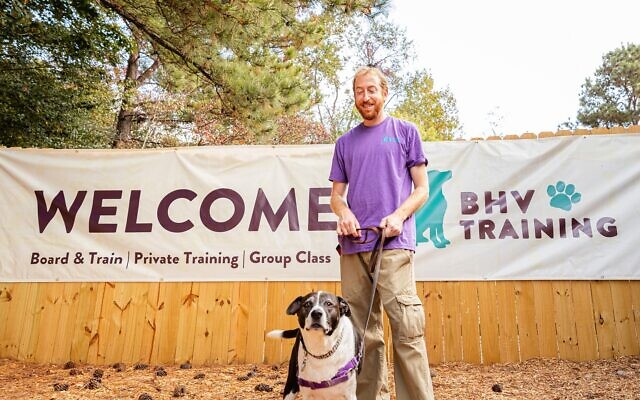Lawyer Flips to Dog Trainer
Michael Litzky changed vocations to land his true fit -- helping owners manage their dogs.
After 37 years with the Atlanta Journal-Constitution and now with the AJT, , Jaffe’s focus is lifestyle, art, dining, fashion, and community events with emphasis on Jewish movers and shakers.

Michael Litzky is the director of training and head trainer at Barking Hound Village. He just took a unique route to get there.
He said, “I practiced law for seven years, more than enough time to satisfy my Jewish mother. I never liked practicing law. I got a puppy, Hazel, in my early 30s, and she was quite the handful, and I started reading about dog training. I was thrilled to learn that modern dog training was based on what I learned getting my psych undergrad degree. Switching professions was the easiest decision of my life.”

At Barking Hound Village, Litzky oversees a staff of four other trainers and handles complex behavioral issues including severe reactivity and aggression. He elaborated, “These are behaviors that can only be addressed in one-on-one training sessions, so I spend most of my time working at homes and our training facility in Buckhead.”
He offers one-on-one training, group classes at the Cheshire Bridge location and the new Westside Atlanta Humane Society, and board-and-train at Cheshire Bridge. The costs for Barking Hound Village’s program include: training at $115 per session, or discounted packages for three or more; group classes (puppy class for dogs five months and younger, basic obedience for the rest) are six-week courses for $250; two-week-long, board-and-train is $1,950. For private sessions at home, they work on specific behaviors. Group class is a set obedience curriculum. The board-and-train program is where they do most of the heavy lifting. For more information, check out barkinghoundvillage.com/training.
Native Atlantan Litzky bases his training techniques on modern science and applied animal behavior and is credited with teaching people — teaching owners to train the dog. He said, “I’ll give some props to my Jewish mother who was a teacher. I grew up running into people relating how amazing she was at what she did…having a knack for connecting to students and getting them to want to learn. I think I share a similar ability and it shows in my dog training.”

Litzky teaches owners how to get inside a dog’s thoughts since people go wrong by providing dogs with too much of an internal narrative.
“’My dog was mad at me when I was gone so they spitefully went and peed on my bed.’ Not true. Your dog was scared that you were gone – separation anxiety – and they found the place that smells the most like you and relaxed their mind and bladder.”

Litzky provided his take on an array of topics related to dog ownership:
Rewards: Positive reinforcement and rewards-based training are more effective than punishments. It’s why they use fish, not shock collars, to work with dolphins at the aquarium. Stay away from aversive training methods, including e-collars, choke chains, pinch collars, or anything that causes fear or pain.
Consistency: Crucial! Dogs are training, 24/7. Ninety-eight percent may be an ‘A’ in school but failing in dog training. If you let your dog jump some of the time, don’t be surprised when they think it’s OK to jump all the time.
Smartest breeds: A very loaded question! There are many different kinds of intelligence. Poodles and border collies are very ‘smart’ dogs, but they’re no match for a beagle or bassett hound in scent. What most people describe as ‘smart’ dogs are really just driven dogs with the need to be mentally and physically active. If you don’t give them proper outlets, they’ll find improper ones.
Dogs in the bed: View dogs as family members and treat them like smart, emotional beings. I’m fine with dogs sleeping in bed as long as it doesn’t cause behavioral issues but would recommend against it if a dog has displayed resource guarding behavior, aggression, or if you’re a light sleeper.
Bottom line: First and foremost, dogs are members of the family with feelings and emotions. The goal is to build a mutually respectful bond and teach dogs to want to listen to you, not that they have to. Have fun. Dog training should be an enjoyable time with a loving member of the family. Not all behaviors are easy, and many can be extremely difficult, but if you do it right, the training shouldn’t add to the stress…also, most dogs don’t want to wear clothes or a costume.



comments